Listening: The Foundation of All Good Communication
We pay good lip service to listening. We know it’s important, and we know when it’s good and when it’s bad. But do we really understand just how big of a role listening plays in relation to all our other efforts to communicate effectively?
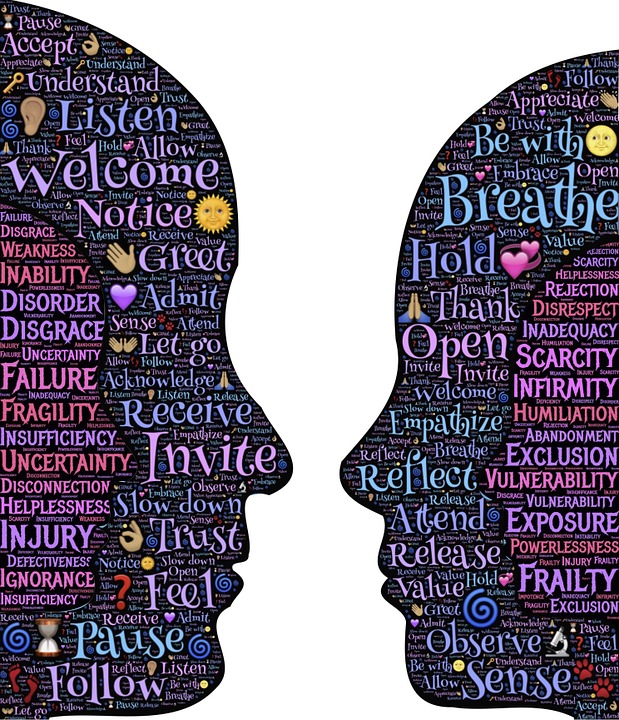
image source: pixabay.com
I’ve been teaching courses in human communication for almost 30 years, and more specifically I’ve taught the basic college course in interpersonal communication at least 100 times. About ten years ago, near the end of a particularly good semester, I randomly asked my class what they considered the most important communication skill. I quickly ran down the list of sub topics in the course: perception, identity/self-concept/self-esteem, non-verbal communication, language and verbal communication, emotional intelligence, gender/cultural understanding, relationship development, conflict management, and of course, listening. I wasn’t surpised when the first student quickly responded by confidently stating that listening was most important, but I was surprised when it became apparent this was a unanimous opinion, and one the students regarded matter of factly. I honestly had never thought about it before. But even more profound was the way they began to explain their consensus.
I still remember how the first student followed up with an explanation. He said all of the skills were important, but each one rested on listening, or couldn’t really be mastered without a strong understanding of listening, and an ability to listen effectively.
So then we broke it down by section of the course.
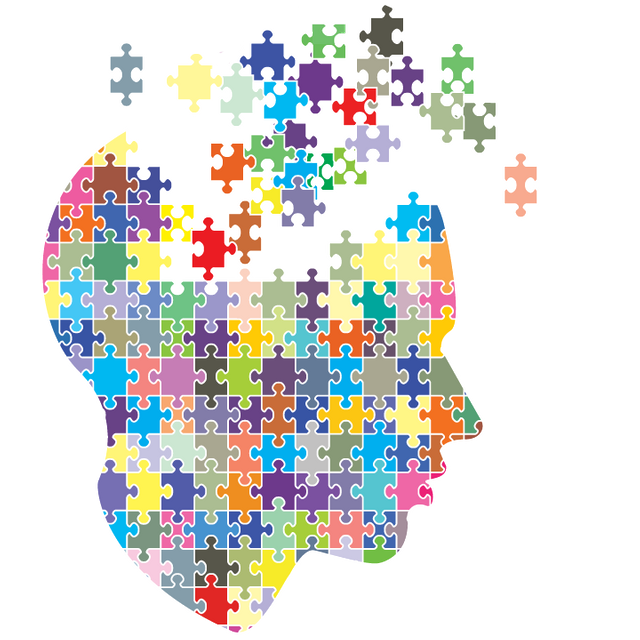
photo source: medium.com
Perception:
I always place a strong emphasis on perception as the foundation of all our communication. How we perceive the world, others, and our communication is relatively unique and based on our own experience. It determines what bits of reality we attend to, select, and process, and how we ultimately interpret what’s left.
In class that day, my students explained that the most important skill in regard to perception is “putting yourself in others shoes,” or trying to understand their experience, and the only way to really do that is to listen. Simple enough.
Identity, self-concept, and self-esteem:
Although these concepts relate to how we understand ourselves, manage our outward projection of self, and do our own work to be secure and happy, my students explained that they are developed more soundly when we spend more time listening to others than speaking. When we are too self absorbed or inside our own heads, we tend to be more insecure because we fail to see that everyone struggles, and that everyone has their own insecurities. It’s not that seeing weakness in others makes us feel good, but it helps us understand we aren’t alone in our fears and doubts. There are obviously many more facets to understanding identity, self-concept and self-esteem, but I liked the way my students were looking at it.

photo source: pexels.com
Nonverbal Communication:
One of my perennial favorite topics in the course, it is always eye-opening to students to learn how the majority of meaning we create and sustain with others is through nonverbal, in contrast to verbal, communication. Different studies have shown that as much as 85% of overall meaning is conveyed through nonverbal cues. This is a critical bit of knowledge in developing higher levels of communication competence, and the skill of recognizing and accurately identifying specific nonverbal cues is very important. Two simple examples are knowing when someone is lying, and how to make sure someone believes you when you’re telling the truth. My sharp students explained on that fateful day that in order to be good at nonverbal communication, you have to be a good listener. If you’re too focused on speaking and conveying meaning, you aren’t paying attention to everything someone else is telling you with facial expressions and gestures.
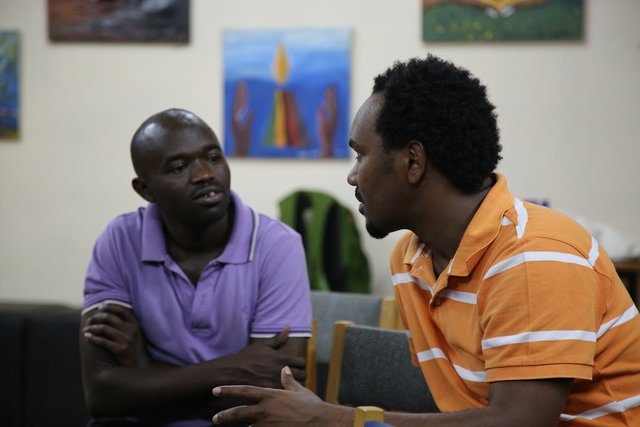
image source: Flickr.com
Verbal Communication:
In order to be effective in our verbal communication we need to have a strong knowledge of language, and we need a sufficient vocabularly, but my students pointed out that even more important is knowing when to speak, and how to encourage others to listen when we do speak, and that is accomplished by being a good listener first. Others will be more inclined to listen to us when we let them know we will take all the time necessary to listen to them. So if we aren’t listening first, our attempts at communicating verbally may very well fall on deaf ears. Brilliant.
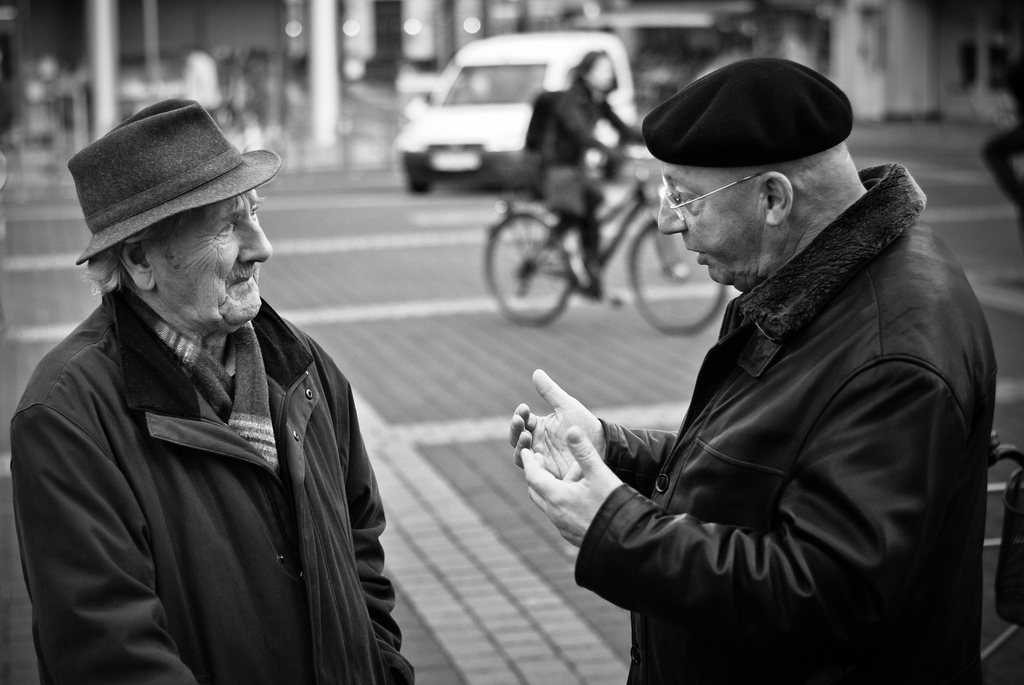
photo source: Flickr.com
Emotional Intelligence:
If we think of our own perception as a filter surrounding us and influencing how we see the world, our emotional experience is like a second filter just outside that (or inside). Any emotion we feel will “color” our perception. For example, if I am in a foul mood, and feeling frustrated or impatient, I will experience someone else’s good will, or lack there of, differently than if I am happy and at ease. Understanding our own emotional states and how to manage them is a powerful part of our overall communication competence. My students eloquently explained that developing such emotional intelligence comes from our interaction with others, and specifically, by talking about emotion. If we aren’t listening to what the people in our lives are telling us about how they feel, then we will not fully understand our own emotions. On the flip side, “listening” to our own emotions is critical as well. When we judge our own feelings, or worse, try to stifle them or deny them, it is almost like the harm done to our relationships when we fail to listen to others.
Relationship Development
The building block of any relationship is self-disclosure. You tell me something about yourself that I otherwise wouldn’t know, and if I desire to grow closer to you I naturally reciprocate with information about myself that you wouldn’t otherwise know. This begins slowly, and relative to each person’s comfort and security with each other and the situation. If we are insecure and/or nervous, we tend to think too much about our own thoughts and feelings, and self-disclosure is stifled or sometimes worse, inappropriate. The 180 degree opposite of that happens when each person is focused more on the other than themselves. This is really accomplished by listening first, and speaking in turn.
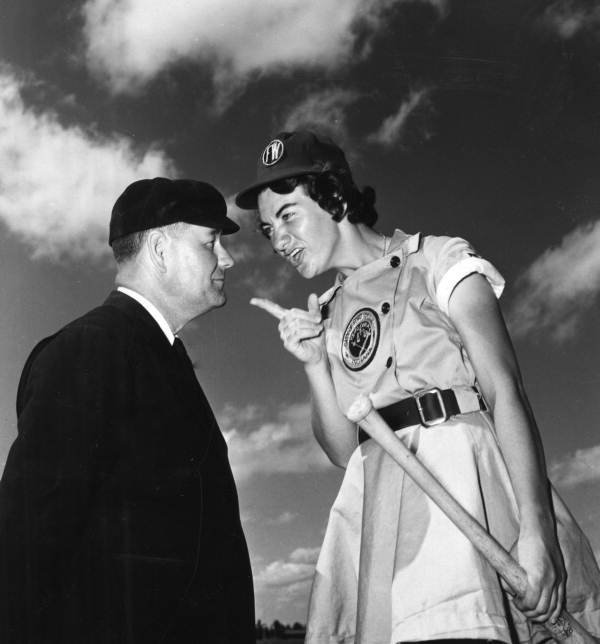
photo source: commons.wikimedia.org
Conflict Management
In conflict we might see the most dramatic value of listening. When you think about it, unresolved conflict can really only continue in the absence of listening. We may engage in conflict for any reason at any time, and it usually is rooted in one or both people feeling like they aren’t being heard or understood. When two people fight, they usually focus on their own words, because to win a fight requires out-smarting the opponent. If I can just make my friend realize he is stupid or outmatched then I end the conflict with a decisive knock out. But we all know the only true resolution comes from a win-win mindset. When one person wins over another in conflict, the residual aftermath of hurt feelings and judgement of low competence will surely become the prior conditions of a future conflict, unless of course the relationship terminates first. To avoid this unhappy end, or future, we simply need one of us to listen. It’s like a ninja tactic, really. If you ever find yourself yelling at someone, yelling back and forth, all you need to do is stop and listen, and within seconds the other person will stop yelling too. We only yell when we think we aren’t being heard. In less heated conflict, the concept still applies. The listener always controls the conversation. And in conflict, it’s like two cars headed toward each other with their high beams on. If one car flips to low beams, at least one driver is able to see. Only in conflict, it’s like the person who flips to low beams is the one who can see. When we are arguing we are more or less blind. So by being the listener, you let the other person know you will hear their words, and as a skilled listener you will sense when it’s your turn to speak. That can take patience, but patience is greatly enhanced by insight.
So at the foundation of all these other skills and aspects of communication is listening. At this point it might be a good idea to zero in on what it takes to be a good listener.
Effective Listening
No one will be a good listener without a genuine intention to understand, comfort, or grow closer to another. In family and romantic relationships the motivation might be love. In less personal relationships it is simply respect. Intention cannot be forced. It has to be a heartfelt goal, and when we try to fake it, it might work to influence some people, but it isn’t sustainable; it doesn’t sustain quality relationship. Relationships develop through the reciprocal sharing of unknown information that occurs naturally when we mutually trust each other. Trust. Perhaps the most important concept of all in relationships. And the purest way to build trust is through genuine listening.

photo source: pexels.com
Thanks for reading!
About Me
I am an assistant professor of communication at Community College of Philadelphia where I have taught for ten years. I have also taught at Southern Illinois University at Carbondale, Seattle Central Community College, Shoreline Community College, La Salle University, Penn State Abington University, Chaminade University, and Delaware County Community College. I am also a track and field coach; I am an assistant coach at my local high school, and my wife and I run a youth track and field club in our town. In addition to my teaching experience, I have over ten years experience in both retail and hospitality management. As a result of all of my work experience, I have a solid understanding of what people, especially employers, mean then they say they want people with good communication skills. It is not what most people assume, and I hope to share some of that insight through this blog.
Explanation of my use of the #sustainability tag:
I am passionate about sustainability. We often think of sustainability in regard to the environment, as that is the context where we hear of it most often, but I believe we need to think of it more personally and globally. As a life-long teacher I have to think of my long-term sustainable approach to the job. As a communication teacher my guiding principle is sustainable communication and relationships.
Thanks,
Craig
I find it interesting though that as important as it is, listening is so often denigrated in American culture. We idealize orators, from the eloquence of MLK or FDR, to whatever comes out of the mouth of DJT, it doesn't matter what they are saying, we give the speakers power.
No to make this too political but the last presidential election came down to a woman who listens and a man that speaks constantly. I loved this write up on Hillary, and there were several others like it, that maintained that the one thing that was impressed upon everyone who worked with her was how well she listened. I think a lot of this has to do with some people's predilection for authoritativeness and power, but that's not how effective leadership works and the sooner we acknowledge the power of the listener the sooner we can actually find some real consensus on how to move this country forward.
Thanks for the thoughtful comment. Your reference to Hillary and the election is spot on, and just another reason for the proverbial smh. It doesn’t surprise me to read about her listening habits. I’m a firm believer that leaders listen. True leaders, not demagogues who attract toadies that are just seeking their own path to power. “Listening for leadership” is a title I have played around with in the past for a yet unwritten book/article. Maybe I will have to revisit that here. Have you written on the subject. I’m going to scan your blog now, but feel free to leave a link here, especially to anything less recent. Here’s to moving forward. Cheers.
(Just realized you wrote the post on trust!)
Not really, although this discussion has some ideas kicking around my head about a post on using empathy to augment your listening ability. I'm also about to go back to school to get a Masters in I/O Psych (just finished my application!) so I'm sure I'll be revisiting the issue many times over the next two years!
That’s great that you’re starting a new program. Be sure to fit some comm classes in with this psych classes :). Empathy to augment listening sounds good. Every interpersonal textbook notes empathy as an example of effective listening, or really more general as just a type of listening. But I think it would make sense to consider it as an intention that would help guide one to be a better listener as well.
I'm sure there will be, my school is very business focused and they try to work comms into the entire curriculum. I think empathy is really its own special type of skill. It's similar to listening in that it is taking in information the other party is giving out, but it is on a much more subtle and instinctive level. It's a channel that in some cases you need to make special effort to open. It's also something that can be developed separately as a skill and engaged or disengaged when appropriate. For example, empathy can actually be harmful to listening when someone is trying to sell you something an you really need to focus on listening critically to their terms.
Good point regarding when not to listen empathically. It’s all about flexibility and knowing the right mode for the situation. You gave me a couple of ideas for future posts. Thanks.
Communication is tricky and I'm not sure our current technologies aid in this process. Social media, messaging and texting are sometimes a barrier to effective in my mind. We see this breakdown on the time on social media. I wrote this a while back:
https://steemit.com/philosophy/@kobiespriggs/limits-of-conversation-and-the-subsequent-rise-of-the-sophist-logos-ethos-and-pathos
The effect or influence of technology on interpersonal communication is an important topic. I’m finding that the majority of my students know that smart phones have had a certain negative impact, and it seems that people are coming back to a middle ground of at least trying to get back to more face to face communication. At the same time, the technology isn’t going anywhere and is going to keep developing and throwing more curve balls at humanity, which is just more reason to keep researching, learning and teaching human communication.
I think we just need to be conscious of the way technology shapes us. It is ontological design. We seem to believe that we (being the arrogant species we are ) bend and master technical advances and nature. However, often we aren't reflective of the ways technology returns the favour and moulds us back! If we can get better at this I will be more hopeful! :)
I like what you said about self disclosure. I heard someone say Intimacy = Into me, you see. I believe Intimacy is crucial for any relationship. I would like to see more in the "Identity" section. Understanding ourselves and others and our identities is critical to forming a proper relationship and having good communication. Here is an article i recently wrote. Thanks.
https://steemit.com/life/@cryptosphere/path-to-world-peace-man-and-woman-lion-and-lamb-fire-and-water-protestant-and-catholic-masons-and-monks
Thanks. I like the intimacy=. This is my first attempt at writing about a subject I should feel comfortable with, but its hard not to be a perfectionist. Writing about communication is tricky because one could never say it all. I am hoping I can return to each part (like identity) and expand in different ways. You're post is a good read. I am not religious, but appreciate reading all sorts of faith-based perspectives. As a communication teacher I try to encourage that respect and curiosity in my students regardless of their own faith. I think your post does a good job of speaking from your faith, while also providing some fairly concrete advice -- easier said than done, as I have witnessed in some attempts.
Very insightful and educational. I love how you listened to your students’ perspectives and were able to learn from them. Listening is such an important communication skill but it doesn’t seem to be treated that way. I have realized in recent years that my ability to really listen to others effectively needs some serious work. I’ve also realized that in order to improve my listening skills it takes a lot of hard work and intentionality, but I have already seen the positive results of practicing good listening habits in my own relationships. I am highly intrigued by the study of communication and emotional intelligence and what causes us to act and react the way we do in specific situations. I look forward to following and interacting with your content.
Thanks for the feedback. It’s really good to hear that you recognized the need for improvement and not only were able to make the physical shift but also sense the benefits right a way. On aspect or teaching communication that is very challenging is that real change and increased competence requires changes in behavior, and changes in behavior do not happen over night. Intention, as you mention, is key, and then trusting the process of working through that intention. But the reward is often immediate — we know success when it happens, and so tapping into that will help to keep improving.
Thanks for such a meaningful message. My partner and I have a lot of problems communicating, and its tearing us apart, she says I dont have anything to say, but shes usually talking over me and not listening to what I have to say. its very disheartning and causes a lot of strife in our relationship. I just reposted this, so hopefully she will read it ;-)
@armageddonparty, please feel free to add more detail if you would like more insightful advice, but just based on what you wrote, I hope you figure out how to open up a dialogue about this with your partner. In general, I think our best option to influence any type of change in a current relationship is to model the behavior we are hoping for. In your case, where listening is the issue, as is so common, it means you have to listen. The quandary is that when a partner fails to listen in the ways we want them to, it is hard to demonstrate good listening while telling them to be a better listener. So the reality of it looks more like you doing a lot of listening, and when it seems like you might be able to get the message across, saying something like, "I am hoping we can talk about something that is really bothering me." A caring partner will respond to that appropriately, but at the same time, we all get defensive, so as the person modeling good listening you have to be prepared for anything. If your partner is open to hearing what you have to say, then try stating something like, "I really want to share things with you as you have asked me to, but when I do it seems like you really don't want to listen to me." Try to be specific. As long as you make listening the priority, you can have more control over the conversation why insisting on talking about the problem, but switching back to being the listener when your partner takes back the floor. It can be tedious, but it works. At least to find out if your partner is willing to try to work with you. As I said, feel free to give me more detail if you like this advice and would like more.
This post has been resteemed from MSP3K courtesy of @isaria from the Minnow Support Project ( @minnowsupport ).
Bots Information:
Join the P.A.L. Discord | Check out MSPSteem | Listen to MSP-Waves
Very glad you addressed non-verbal communication. As an autist, this is how I am able to understand verbal communication. Words and tones don't always come across as they're meant, nor do facial expressions. I look to the whole body when I'm speaking or listening to someone. Upvoted and resteemed. Now following.
Thanks for the comment @shawnamawna. I am very interested in how learning about communication helps autists. Luckily with much needed advancements in how autism is addressed in school, we are finally seeing more college students who represent this population, and those students are proving to be very valuable contributors in my live classes.
This post was resteemed by @bestcontent 🌎
Congratulations! This post has been upvoted from the communal account, @minnowsupport, by cstrim from the Minnow Support Project. It's a witness project run by aggroed, ausbitbank, teamsteem, theprophet0, someguy123, neoxian, followbtcnews, and netuoso. The goal is to help Steemit grow by supporting Minnows. Please find us at the Peace, Abundance, and Liberty Network (PALnet) Discord Channel. It's a completely public and open space to all members of the Steemit community who voluntarily choose to be there.
If you would like to delegate to the Minnow Support Project you can do so by clicking on the following links: 50SP, 100SP, 250SP, 500SP, 1000SP, 5000SP.
Be sure to leave at least 50SP undelegated on your account.
A Turkish proverb
"talking is silver, listening is gold."
Good one!